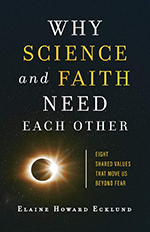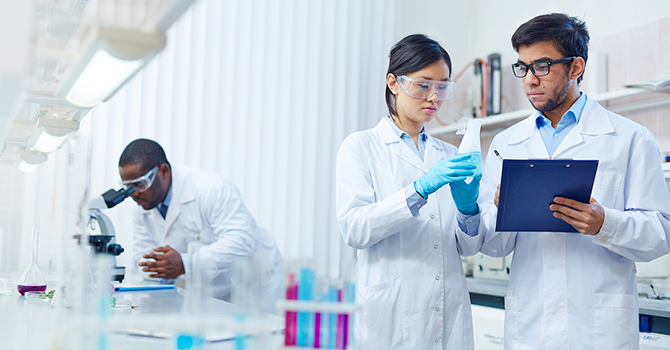Moving Past Conflict
 A few years back, as part of research I was conducting, I sat in on a group meeting in a rural church in the farm country of upstate New York. One of the women asked me what I did for work, and I told her I was a doctoral student at Cornell University. “Yuck,” she replied. “I wouldn’t want my children to attend Cornell.” I was shocked. Most people think of Cornell as a top school. When I asked her to explain her reaction, she told me she wouldn’t want her children to go to Cornell because they might be exposed to scientists who would raise doubts in their fragile young minds that would take them away from their faith.
A few years back, as part of research I was conducting, I sat in on a group meeting in a rural church in the farm country of upstate New York. One of the women asked me what I did for work, and I told her I was a doctoral student at Cornell University. “Yuck,” she replied. “I wouldn’t want my children to attend Cornell.” I was shocked. Most people think of Cornell as a top school. When I asked her to explain her reaction, she told me she wouldn’t want her children to go to Cornell because they might be exposed to scientists who would raise doubts in their fragile young minds that would take them away from their faith.
Pastors often avoid topics related to science or to the relationship between Christianity and science. They worry that exposure to science -- specifically certain scientific findings and ideas that might seem to contradict religious ideas -- will cause Christians to begin to doubt aspects of their faith and eventually lead them away from their faith. But I have found that when Christian parents and pastors try to “protect” kids from doubt by keeping them from exploring or understanding scientific ideas, they may actually be driving them away from the church. These youth miss the opportunity to experience prudent doubt, to openly wrestle with their faith in a way that will lead both to more openness toward science and to a stronger faith.
 I have also found that Christians who do not talk about science at church are usually left to believe what the loudest voices tell them: that all Christians are anti-science and all scientists are anti-Christian. The media often tells us that most Christians, especially evangelical Christians, reject science. More specifically, we hear that Christians ignore scientific evidence, are hostile to evolution, are skeptical of climate change, and oppose biomedical technologies. Christianity is often presented as a religion that does not permit doubt, resulting in followers that trust in silly things that are sometimes anti-science.
I have also found that Christians who do not talk about science at church are usually left to believe what the loudest voices tell them: that all Christians are anti-science and all scientists are anti-Christian. The media often tells us that most Christians, especially evangelical Christians, reject science. More specifically, we hear that Christians ignore scientific evidence, are hostile to evolution, are skeptical of climate change, and oppose biomedical technologies. Christianity is often presented as a religion that does not permit doubt, resulting in followers that trust in silly things that are sometimes anti-science.
Despite these perceptions, when I interviewed Christians about science and the relationship between science and their religious beliefs, I discovered a much different reality. I met Christians who were very open about experiencing doubt when thinking about the relationship between science and their faith. I remember one evangelical Christian math teacher in particular. She argued that we should not be afraid of doubt. In her view, doubt is a natural human response and, wrestled with rightly, can be a human virtue. What’s more, she believed that doubt should be honestly expressed in the safety of Christian communities. “To be honest, I’ve doubted, OK? I’ve woken up and doubted, ‘Is there a God? Is there really a God? Is what I believe really true? This sounds crazy. A man died and rose again? Who believes that?’” she said. “Everyone, I think, has had doubts before, but I think that the thing is, I doubt my doubts. And I believe that I didn’t just conjure up this faith. I believe God gave me faith.”
Boundary Pioneers
In my research, I have met evangelical Christians who ignore scientific evidence and are hostile to science, but I have also met many others who have found ways to work through the doubts science raises about their religious beliefs, ultimately accepting science and remaining staunch in their faith. Some see science as a tool or a calling that helps them better understand God’s work. Many find that it provides support for their faith.
I think we need to show how science can bolster faith (which is not the same thing as certainty). The boundary pioneers -- scientists who are committed Christians and who break down the boundary between science and religion, those who live in both worlds -- are our models. They show us that scientific evidence has actually opened up their faith to mystery and awe. They show us that faith doesn’t have to equal certainty; faith can include or coexist with doubt, with critical questions, and with shifts in perspective as more information comes to light.
For example, my studies show that nearly 50 percent of evangelicals believe that science and religion can work together and support each other, and 67 percent of evangelical scientists believe science and religion can be collaborative. “Science is fantastic and I thank God for this,” one evangelical Christian said. “It isn’t as if He didn’t want us to find out about His incredible creation.”
My research also shows that scientists in the US are far more religious than the stereotypes often presented in the media would have us think. Among what I call “rank and file scientists” (those who work outside of top research universities), 65 percent identify as Christian and almost 21 percent as evangelical. Among scientists working at universities and colleges, nearly a quarter identify as Christian. Of this group of Christian university scientists, more than 80 percent attend church, nearly 84 percent pray, and 58 percent affirm the authority or inspiration of the Bible.
Scientists who identify as Christian often believe their faith bolsters their scientific work, and some see it as adding meaning to their discoveries. Some also believe science can strengthen faith. “I don’t see science as an occupation,” an evangelical biologist told me. “I see it as a cathedral where I come to worship God.” Explaining how she sees God’s work in her research and how this strengthens her Christian faith, a professor of genetics told me, “It is the word of God and his laws that are reflected in the very sequence, the patterns, the sequences of the genome that give expression to biology as we study it.”
I met Blythe (the professor I introduced earlier who studies the brain and nervous system) one Sunday morning at a women’s Bible study group. She believes that her faith influences everything she does and how she perceives the world. Even though some people at her church have had trouble believing that she can be both a Christian and a scientist, she feels that her scientific work actually affirms her belief in God. She told me,
You look at DNA or at neurologic systems, and you look at the amount of order that is actually in those systems, it’s just remarkable. Things generally become less ordered; they degrade and they become more random so to think that things could become more ordered goes against one of the basic premises of science, and so you have to think, “How did this just happen? How did all this order occur randomly?” Because it’s not how we think of things working. And so, somebody who doesn’t have a faith background doesn’t really understand that perhaps there’s a Creator, someone who created all the order.
Scientists who are Christians can help their fellow Christians enter the realm of science and see how it can help us further express, use, and live out our faith. Christian scientists can also help young Christians -- especially those who might be considering entry into scientific or technological occupations -- figure out how to approach commonly perceived conflicts between science and religion and see how scientific work can be a kind of mission or calling.
As I mentioned earlier, for the past four years, I have led a program on faith and science in the church I attend in Houston, Texas. There are about four hundred people in the congregation, which is considered small- to medium-sized in Texas. (In upstate New York, where I was raised, a four-hundred-person church would have been considered a megachurch!) I have also shared some of my research on Christianity and science in my church and in other churches throughout the US. I have found that congregations thirst for dialogue on science and religion, to hear what their fellow Christians believe and how they reconcile their faith with science. Congregants are looking for guidance when it comes to integrating science with their faith.
In surveying and interviewing hundreds of Christians, I have also found that they are often looking for a safe place to express doubts, including those raised by science. I think about a geneticist who told me he often felt lonely as a committed Christian who was in graduate school in the sciences at an elite university. He longed for a local church where he could talk about his experiences and fears. I also think about Sarah, the scientist we met earlier who studies evolution and climate change. When she started learning more about evolution, she began to have some doubts about her faith. She told me what it was like to bring these doubts to her church community: “I grew up in a conflict model in the church. [When] I was interested in being in the sciences that was OK, until I started getting more interested in natural sciences and especially evolution, and I got the pressure that was pretty much like, ‘Hey, you can either be a Christian or a scientist. You’re going to have to choose.’” Thankfully, Sarah did find a way to be both a Christian and a scientist, but how might her faith have been enhanced by a supportive Christian community?
Doubt in the midst of a faithful community is not necessarily damaging; it can lead to opportunities for growth and progress. Christian communities can embrace doubt as a powerful and useful tool for probing our faith and for asking hard questions that will test and prove the mettle of our faith. The doubts raised by science don’t have to drive Christians away from faith; in my experience -- as well as in the experience of many in my studies -- doubts, if wrestled with prudently and productively in our churches and Christian communities, have the potential to hone and enhance our faith.
A Christian community I happened into during my undergraduate years at Cornell University brought me back to faith and into a local church different from the one I left. In the arms of its safe confines my doubts were held in the open, and over time my faith deepened. And just so, Jesus visited Thomas again, in compassion letting him see. The writer of the Gospel of John tells us that “a week later [Jesus’s] disciples were in the house again, and Thomas was with them. Though the doors were locked, Jesus came and stood among them and said, ‘Peace be with you!’” (John 20:26). Then Jesus spoke to Thomas specifically, addressing his doubts: “Put your finger here; see my hands. Reach out your hand and put it into my side. Stop doubting and believe” (20:27). And Thomas responded with awe, “My Lord and my God!” (20:28).
I believe that we should look at the scientific virtue of doubt as a religious virtue as well. Christian communities should become places where doubt is honored. Rather than something to be feared, prudent doubt can be a pathway to greater creativity and awe. As the writer Anne Lamott says, “To paraphrase Paul Tillich, the opposite of faith is not doubt, but certainty.”
And certainty may be missing the point entirely, forgetting that God is God and we are not. Faith, though, includes truthful recognition of the mess, the emptiness, the discomfort with what is unknown. It means holding them all in the safety of community and letting them be there until some light returns.
From “Why Science and Faith Need Each Other: Eight Shared Values That Move Us Beyond Fear” by Elaine Howard Ecklund ©2020 (Brazos Press). Reprinted with permission of the publisher. All rights reserved.









